- Home
- Jason Webster
Guerra Page 25
Guerra Read online
Page 25
Franco maintained an uneasy alliance with fascist Italy and Nazi Germany, meeting Hitler at the French border town of Hendaye in 1940. The Caudillo, with his Galician retranca, managed to sidestep further pressure from the Führer for Spain to enter the new European war, Hitler later remarking to Mussolini that he would rather have three or four teeth drawn than have to meet Franco again. Later, when he heard that Franco’s government had declared the Virgin of the Fuencisla, the patron saint of Segovia, a full Field Marshal for her role in the defence of the town during the Civil War, Hitler announced he would never visit Spain under any circumstances. Franco was a canny player, though, and when by 1942 the tide against the Axis Powers was beginning to turn, he began to tone down overt support for the Nazis.
What for the rest of Europe became known as ‘the war’, for Spain was ‘the post-war’, la posguerra. It was a time of great hardship and famine: hundreds of thousands of men were held in concentration camps and jails, where many of them were shot or died of illness and neglect. Figures vary greatly, but at least fifty thousand people were executed during this time (there have been claims of up to three hundred thousand deaths), added to a possible two hundred thousand killed in the repression during the war itself. After the indiscriminate murders of the early months of the war, Franco had insisted on personally clearing all death sentences. He gave orders, though, that any appeal for clemency should only reach him once the sentence had been carried out, and often confirmed scores of executions while drinking his hot chocolate over breakfast, or while discussing matters of state with his ministers. Occasionally he would correct an order, specifying firing squad or garrotting as the means of execution depending on which political party the person was from. When the war ended, this process continued for several more years, well into the 1940s. Winning the war on the ground was only one stage of the process: defeated Republican Spain still had to ‘redeem’ itself for its original sin through blood. The Vatican took a similar view. Having supported the Nationalists throughout the Civil War, Pope Pius XII gave official thanks for Franco’s victory in 1942, at the very height of the Caudillo’s repression of his countrymen.
Meanwhile droughts ruined the harvests and the people starved. Exiles who had fled Spain in the face of Franco’s victory fared little better. Estimates put the number of Spaniards who left at around half a million, perhaps more. Some made it to Mexico and other parts of Latin America, others to the Soviet Union, but many countries closed their doors to the refugees. Britain allowed in just two hundred Republican leaders, including Prime Minister Negrín, who stayed there until moving to Paris after the end of the Second World War. With the fall of France to the Germans, some twelve thousand Spanish Republicans were sent to the Nazi death camp at Mauthausen. Only two thousand survived. Others managed to escape capture and joined the French Resistance, where their military experience proved invaluable. Others joined the Free French forces. Spanish troops were among the first soldiers to enter Paris with the Allies in August 1944. Several ended up in the Long Range Desert Group fighting the Germans in North Africa.
Despite the Allied victory in 1945, Franco stayed on in power for another thirty years. By the 1950s the Americans realized he was useful in their wider campaign against communism: US aid started to arrive and the country was brought back into the international fold. The Generalísimo eventually died in a hospital bed in Madrid on 20 November 1975, still ruthless and still very much in power, a nineteenth-century anomaly in the late twentieth century.
21
Perpignan
‘My grandfather was imprisoned here once, just like me.’
Javier’s hands moved in front of him in quick, confident motions, like a card shuffler’s, giving shapeless form to the ideas and thoughts bubbling up in his neat round head while he spoke. He had barely stopped since he’d sat down, a torrent of words and gestures as he took full advantage of this unexpected visit and the limited time available to us. Few people came to see him at the prison – it was too far away, and meant a day’s drive there and back at least. Not that the remainder of his family cared much for him anyway. Kiki had been coming the most: an old love affair that had ended years back had turned into a bond of loyal friendship. Kiki, Javier insisted, was the most real person he had ever met.
Perpignan prison was unrelentingly grey, as though autumn had come too soon to this derelict little place just over the Pyrenees: the sky, the blank concrete walls, even the windows of the waiting room all radiated a dull grimness, like a fog. It was strange to think that until the Treaty of the Pyrenees in 1659, this area had once been part of Spain – the mountains formed such an obvious frontier you felt nature herself had had a hand in deciding where one country ended and another began. But the previous owners had left an imprint of sorts in the local penitentiary, and while the prison guards were mostly blond and dressed in dark-blue uniforms spattered with the tricolour, the occupants of the prison and their relatives harked back to a previous age. Spanish inmates doing time in France were often transferred here to be as close to home as possible, while the imprisoned locals themselves looked as if they’d be more at home in the Triana district of Seville. Gypsies almost to a man, they crowded out the drabness of their surroundings with a collective colour and energy that almost made you want to commit some crime so you could join them on the inside.
I’d come across the women first, chatting and singing in the draughty waiting room while we waited for visiting hour to arrive. While their children climbed over scratched tables and chairs bolted to the floor, they’d sat down on the hard wooden benches, talking and bustling like a gaggle of geese. It was just another day – a chance to catch up with friends and have a natter. Those over forty came as they were, with house slippers and their hair tied back with bright elastic bands. The younger ones, though, had gone to town on their appearance, their faces freshly painted and navels exposed to the harsh wind, with skin-tight trousers and open-toed stiletto sandals. You sensed they were keen to show that looking good for their menfolk inside still mattered to them – a way of affirming fidelity by saying, ‘I still want to be attractive for you.’ They spoke in a curious patois that seemed to be a mixture of Castilian Spanish, Catalan, French and Caló. In their own minds, though, it was definitely Spanish.
‘What’s the matter?’ I’d heard one of them say to a woman from Madrid who’d come to see her husband. Communication between them was proving difficult. ‘Don’t you speak Spanish?’
‘They’re crazy,’ the woman had later said to me. ‘God knows what they’re speaking but it’s not like anything I’ve ever heard before.’
It was one of the few times of the year when visitors were allowed to bring food parcels for the inmates. Kiki had warned me in advance – no chocolate liqueurs or alcohol of any sort. And nothing could be taken through in foil. I hurriedly helped the Madrid woman unwrap all her Ferrero Rochers one by one and place them in a plastic bag in the last few seconds before we were ushered in. A minute longer and she would have missed her chance to go through. It was her first time there and the guards had only just told her about the rules.
‘They’ll give him a few moments of pleasure, at least,’ she said.
She handed the chocolates over to the guards with the other food she’d brought and rushed through as the doors were closing, smudging her make-up as she wiped away a tear welling up in the corner of her eye.
We’d filed through, eventually getting to the visitors’ room after being made to stand for another ten minutes in an open courtyard that smelt of sewage. As a friend or relative of a criminal you were somehow made to feel guilty by association and suffer some degree of punishment in your turn. We passed a row of offices lined against one of the walls, knocked up from a collection of scrap windows and doors that someone must have picked up off a skip. Planks of oddly shaped wood held the complex together where it looked most in danger of falling down. A terrace of broken, grubby lockers stood along the adjacent walls, their doors hanging off or s
imply missing altogether. The gypsies, confident, assured, buffered by their weight of numbers, were untouched by it all. The Madrileña woman, chewing nervously on the inside of her mouth while she wrapped her white plastic coat tightly over her chest, looked close to breaking down. Sorry people in a sorry world. At least, I thought, there were walls and a roof here: in the past Spaniards had been imprisoned in this part of France on nothing but a piece of bare frozen ground – and purely for being Spanish.
Javier had been in for almost a year after being caught with a right front tyre stuffed with cocaine as he was driving on a courier run to Italy. It was his second and supposedly last trip as he secretly tried to get some money together to pay for a risky new operation in the States that might just save his mother’s life. The police had pulled him over and gone straight to where the drugs were stored, not even bothering to check the rest of the car. Pleading guilty from the start, he was tried and sentenced in less than a week, condemned to ten years and a half-million-euro fine for keeping quiet about whom he was working for. It was the state-appointed lawyer who explained how the supplier – an old friend of Javier back in Madrid – had probably been the one to tip the police off in the first place. In the pretend war on drugs, dealers often handed over little guys to the authorities, keeping the pressure off themselves while allowing politicians to show the public that ‘something was being done’. In the meantime, a month afterwards, Javier’s mother had died of her illness, condemning her son as a criminal on her deathbed, unaware of the sacrifice he was making. The rest of the family, equally ignorant, now blamed him for sending her to an early death. The only good thing that had happened in the past weeks was a reduction in his sentence and the fine. Those too, it seemed, were meant more for public consumption than anything else. With any luck he might be out and back in Spain in just over another year.
Kiki had told me little about Javier other than what had happened to him and that she went up to Perpignan to see him. She’d promised to go this time but the dates of her gigs at the club had been changed at the last minute, and so she was sending me instead, calling me in Badajoz where I was meeting Manolo. I’d like Javier, she said, and he’d appreciate a visit, whoever it was from. And with that, and a brief physical description – twenty-five, very thin, dark hair, prominent nose – I’d set off, travelling across country to Barcelona and then on to Perpignan.
After everything that had happened to him, I’d expected to find a lonely young man, mourning his mother’s death and his bad luck to have ended up in such an awful situation. No one benefited from him being locked up in here – stopping someone driving across Europe with seven kilos of party powder crammed inside his front tyre didn’t seem like a particularly effective use of police time, especially when the authorities could have been after the person who had shopped him in the first place. Javier was a pawn in a game that seemed to move by itself – no one was actually in control.
He was, though, surprisingly cheery when I was shown to the table where he was waiting for me.
‘Jason, my friend,’ he said with a big smile. Forbidden by the world-weary guards from touching each other, it was the closest thing to an embrace he could give me. I noticed his big shiny white teeth framed by dark gums. Thin and dark-haired as Kiki had described, he also had a strong physical energy about him which seemed to radiate from his body like an electric field. He might not be well built, I thought in the fraction of a second when I first caught sight of him, but he was not the kind of person you’d ever want to get into a fight with.
We talked about Kiki at first, our common point of contact.
‘Meeting Kiki was the best thing in my life,’ he said simply. ‘She – and now you – are the only people who have come to see me here.’
I warmed to him immediately, catching something of the incongruity of this spirited young man being in this loveless place. There was a light about him, immediately distinguishable from the rest of the prisoners in the room. The gypsies had street smarts, but there was a different kind of quickness in Javier’s eye which you didn’t often find, even outside prison.
I gave him bits of news from Madrid, as well as a private message from Kiki. He thanked me for bringing the food parcel.
‘How are you getting on here?’ I said. Expecting to hear about his mother’s death and how he’d been unjustly put away, I put on my most sympathetic voice, shifting mentally into listening and comforting mode.
‘Oh, it’s a laugh!’ he said. I gave a look of surprise.
‘Don’t get me wrong – wouldn’t want to spend my holidays here every year, but there’s plenty to be getting on with.’
‘Fantastic,’ I said, trying to adjust to this unexpected burst of enthusiasm.
‘I’m learning to be a car mechanic. There’s a workshop here and they let you do stuff. Just mucking about, really. Thing is, I’ve realized a lot of it is dead simple. You can fix all kinds of things in a car with a soldering iron and spanner. Most car mechanics are taking you for a ride.’
His hands moved restlessly in the space between us as he spoke.
‘As soon as I get out I’m going to set up my own workshop and do it properly – you know, fixing people’s cars for virtually nothing. None of this sending off for expensive parts from God-knows-where. Sorry, my love, your new alternators still at the suppliers in Uzbekistan. The yaks are on strike. If you do it cheap people will always come back. I’ll be up and running in no time.’
There was no point going back to Madrid, he’d decided. Even though he’d told the police nothing about the operation, he was always going to be seen as a problem for the dealers back home: they’d assume he’d be asking them for money all the time to keep quiet, and would do all they could to run him out of town anyway. Now that his mother had died there were no family ties to take him back either. No, he was going to Seville, where his family had come from originally. He was picking up new skills and meeting new people: a new life was about to begin. It was almost as if coming to prison had been the best thing that had ever happened to him.
It was heartening to see him seemingly unbroken like this, even if I did wonder for a minute what kind of contacts he might be making behind bars. I quickly glanced around the room: the gypsies, with their mullet haircuts, were all talking seriously and manfully to their wives, who were giving them adoring looks. They could take this, you felt – it was part of life. The Madrid woman’s husband, though, looked distraught and lost, his eyes like saucers in an expression of fear and shock. The woman had her back to us. From the hunching of her shoulders and position of her head, she seemed to be crying.
‘Drug running,’ Javier said, catching me watching them. ‘Like me. Got caught off the coast in a boat with half a tonne of dope. He gets seven years, the kids buy their stuff from someone else, while the kif growers in Morocco who supplied him carry on as normal. Meanwhile suspicious quantities of his haul make it on to the market anyway, except that he’s not getting any money for it.’
It was hard not to wonder what the point was of locking up people like him. Whom did it protect? And whom did it punish?
‘The police here are corrupt,’ said Javier. ‘So are the guards. But at least they don’t pretend not to be, so you know where you stand. One of the guards is having problems back home – thinks his wife’s cheating on him. The word is, she probably is – with his own brother. But he’s not been an angel himself either.’
‘How do you know all this?’ I asked.
‘We find out about everything in here,’ he said with a grin. ‘Those walls are too thick for a man to get through. Believe me, I’ve tried.’ He winked. ‘But gossip and information seeps through like a sieve. Especially about the guards. They all live next to the prison anyway. Sometimes I think they’re the ones really in jail here. We’ll get out eventually. They don’t get released till they retire. And in the meantime they’re all in and out of each other’s wives like bunny rabbits.’
‘Sounds like a soap opera,’ I said.<
br />
‘Oh, much better,’ he said. ‘We’re allowed TVs here, but you have to pay to watch. I don’t bother – what’s going on around is much more interesting.’
‘So what about this guard?’ I asked.
‘Well, I’ve given him a shoulder to cry on, so he’s been helping me out a bit – extra cigarette rations, that kind of thing. Says he knows all about my case and will do everything he can to make sure I get out as soon as I can for good behaviour.
‘Got to be careful, though,’ he added. ‘These guys have loyalty to no one. One minute they’re your friend, the next …’ He gave a thumbs-down sign.
‘I’m so glad you came to see me,’ he said, hardly pausing to take a breath. ‘It’s good to speak Spanish again.’
‘I thought almost everyone in here spoke Spanish,’ I said. And I explained about the people I’d seen in the waiting room.
‘There are Spaniards here,’ he said. ‘But we’re at the bottom of the pile. They treat the Arabs better than us – because they speak French.’
He told me how his cellmate was an Algerian. He was giving Javier French lessons in return for Spanish lessons and cigarettes – hence the usefulness of the guard.
‘You’d think it would be one language for another, right? No. In here, Spanish on its own is not worth the same as French. That’s why I have to give him cigarettes as well. I’m a second-class citizen.’ He laughed. ‘There’s only one direction from here, though, and that’s up.’
Everything, at every turn, was given a positive interpretation. If anyone was going to survive being in prison, it was Javier. He seemed to have the right balance of sensitivity and wit to hang on to who he truly was without falling into despair or hardening his outer shell. Prison often broke you or absorbed you. But Javier seemed to be successfully riding on the surface of it all. There was, though, something of an exotic and elegant wild animal about him, and it pained me to see him caged like this.

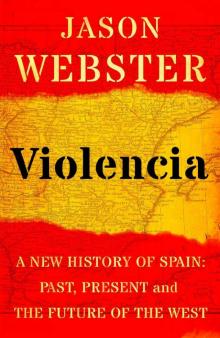 Violencia
Violencia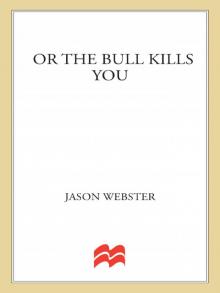 Or the Bull Kills You
Or the Bull Kills You The Killing of El Niño Jesús
The Killing of El Niño Jesús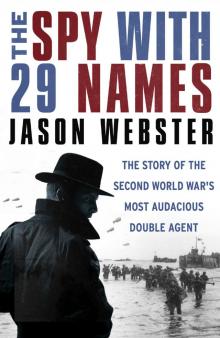 The Spy with 29 Names
The Spy with 29 Names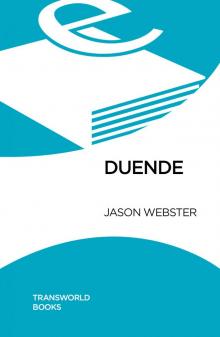 Duende
Duende Guerra
Guerra Sacred Sierra
Sacred Sierra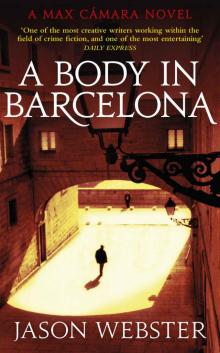 A Body in Barcelona: Max Cámara 5
A Body in Barcelona: Max Cámara 5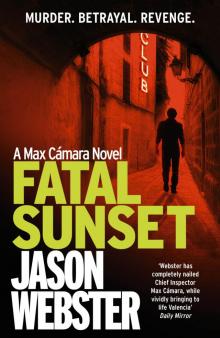 Fatal Sunset
Fatal Sunset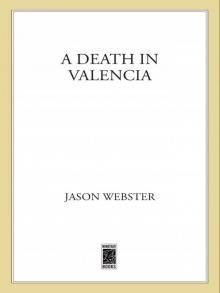 A Death in Valencia
A Death in Valencia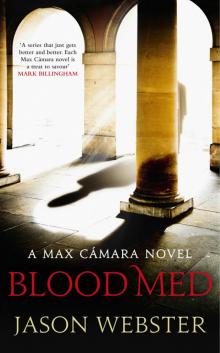 Blood Med
Blood Med Andalus
Andalus